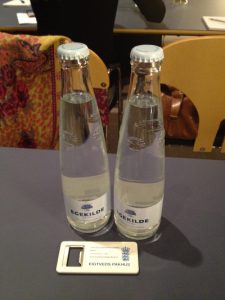 The only point of genuine contention in the first session of the Danish Presidency press trip with Europe Minister Nicolai Wammen was a debate about the cost of running a Presidency. What – a Polish journalist asked – is the Danish Presidency not doing, when it costs €35 million while the Polish Presidency cost €115 million?
The only point of genuine contention in the first session of the Danish Presidency press trip with Europe Minister Nicolai Wammen was a debate about the cost of running a Presidency. What – a Polish journalist asked – is the Danish Presidency not doing, when it costs €35 million while the Polish Presidency cost €115 million?
Wammen’s answer was interesting, but missed the point. We won’t have, he said, as much merchandise as previous presidencies (and – apart from ties for participants – he seems true to his word), and bottled water will not be available in meetings. The latter drew laughter as there was water in bottles on all delegates’ tables. The last time, one hopes. There is also a commitment, he said, to making sure public transport is used wherever possible and to make this Presidency the greenest ever.
However none of that comes close to accounting for €80 million. The reason – as far as I can tell – is that all the wider PR work of a Presidency – the signs at airports, the educational activities in schools, the effort to show the population the value of a Presidency has been cut this time. I’m torn as to whether this is a good thing. Denmark suffers the same problems of lack of knowledge and engagement in EU matters as other countries, and a Presidency is an opportunity once every twelve and a half years to do something about it. Conversely some of the cash used is often crass and useless expense, so perhaps the cuts are important.
Anyway, I am glad we opened up with a discussion of whether the Danish Presidency is worthy of its Brussels nickname: the Discount Presidency of the EU.








Actually, every Presidency comes by every 13.5 years (taking into account that are 27 MS now), but don’t worry, you are not the only one trying to forget Romania and Bulgaria also joined 🙂
A cursory look in google suggests that the Danish Presidency might be the one run on by far the smallest budget. The Hungarian Presidency cost about €75 million while other governments spent around €100 million on average. (http://www.bbj.hu/politics/commissioner-puts-cost-of-hungary-eu-presidency-at-eur70-75m_60972)
To me it is a missed opportunity which should have been used to educate people on how the EU actually works. In any case, maybe somebody could ask the presidency how they plan to invest their “savings” 🙂
I have to agree with Ron’s comment, you can not underestimate the importance the Poles attached to their first Presidency. As a very pro-European country, with a pro-European PM and an agenda to protect and increase the EU budget – it’s not suprising the Poles wanted to make a bold statement.
But is public education the task of a presidency? Shouldn’t that be something that happens all the time. The EU presidency gives an opportunity for EU to take centre stage nationally, but does this extraordinary situation explain how the EU works and is important especially when you aren’t the presidency.
The EU-Presidency needs to make sure that meetings run to plan, decisions get made, proposals move forward and that EU Council of Ministers is as decisive and effective as can be.
Public education is a nice to have not a need to have for a presidency. Even if I do believe that it is something that we will get automatically when the media are more concerned with the EU than normally.
The value of a presidency is in particularly shown by the results won at the negotiation table for the benefit of the EU. The leadership shown by the Government for the benefit of Europe. I think the Danish 2002 presidency was such a success in the eyes of the population because of the Government being able to say “we made the enlargement happen”.
The 2012 presidency does not have as clean cut single issue to “solve”, but faces a wider range of issues and perhaps solving the eurozone crisis in 6 months might be taking the mouth too full. But if they/we do do it, that would be rather great. But that’s not the measure of a successful presidency for Denmark, we need to keep the wheels turning. in the words of the slogan of eu2012.dk We need to keep “Europe at work”
Finally there has been produced educational material, it can be found on http://eu2012.dk/en/EU-and-the-Presidency/Undervisning/Undervisning?_id=576AEFF033C04477AF82026987E8763A&_z=z
Sorry for being a bit long and – perhaps – a little protective, if not defensive.
I doubt that any “national EU education program” of any EU Council presidency has made any national public understand the EU better, so I feel the Danish have made a good choice in reducing the budget.
Comparing it to the Polish may still be a bit false as this was the very first time the country held the presidency, and getting both a national public to notice and an international public notice Poland may have cost a bit more than usual (not sure about the costs of the other presidencies).